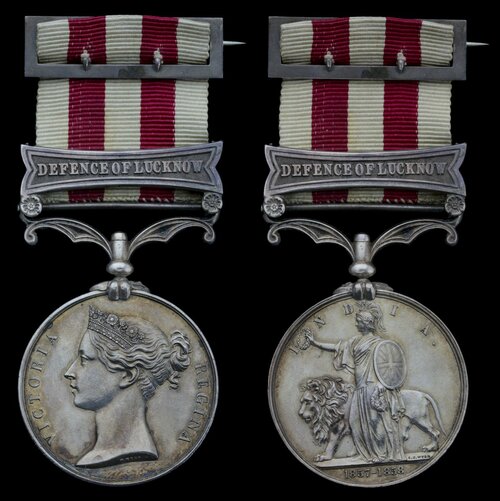
Auction: 21002 - Orders, Decorations and Medals
Lot: 30
'Even the European hospital which had been established in the banqueting-hall was not safe from the fire of the enemy. One of the doctors had his pillow taken away from his head by a round shot. Dr. Boyd, the indefatigable surgeon in charge, could tell of many more extraordinary occurrences which he had heard of from some of the wounded men.'
The superb 'Defence of Lucknow' Indian Mutiny medal awarded to Assistant Surgeon W. Boyd, 32nd (Cornwall) Regiment, who superintended the European Garrison Hospital - in addition to his Regimental duties - for the entirety of the siege, surviving to be promoted Surgeon and earn a brace of 'Mentions' for his brave and valiant work over the course of those horrific months
Indian Mutiny 1857-59, 1 clasp, Defence of Lucknow (Asst. Surgn. W. Boyd, 32nd L.I.), mounted on silver riband buckle, nearly extremely fine
William Boyd, a native of Tomintoul, Banffshire, was born on 21 June 1828 and after four years of study at Marischal College Aberdeen (1843 - 1847) was appointed Assistant Surgeon of the 4th (King's Own) Regiment of Foot on 12 March 1852. Two years later, on 20 January, he exchanged into the 32nd (Cornwall) Regt. and fought with them throughout the Defence of Lucknow between 30 May - 27 November 1857.
The 32nd made a name for themselves during the siege, with no fewer than four awards of the Victoria Cross being made to members of the regiment for acts of supreme gallantry and the whole regiment was later honoured with the distinction of being made a regiment of Light Infantry. Furthermore, upon the death of Sir Henry Lawrence (4 July) it was the commanding officer of the 32nd, Lieutenant-Colonel John Inglis, who assumed overall responsibility for the ongoing defence of the Residency and its environs.
We find Boyd, too, singled out by name for his good work - Julia Selina Inglis (wife of Colonel John) in her book The Siege of Lucknow: A Diary wrote: '4th...There is no end to the stories that might be told of extraordinary shots and hair-breadth escapes during the defence. Even the European hospital which had been established in the banqueting-hall was not safe from the fire of the enemy. One of the doctors had his pillow taken away from his head by a round shot. Dr. Boyd, the indefatigable surgeon in charge, could tell of many more extraordinary occurrences which he had heard of from some of the wounded men'.
Boyd later received official recognition for his valuable services, earning a pair of 'Mentions' from Colonel Inglis and the Governor-General respectively (the former 16 January 1858, London Gazette refers) and promotion to Surgeon "for eminent services" rendered throughout the whole siege. Boyd is further mentioned as officiating medical officer-in-charge of the European garrison hospital, in addition to his duties with the 32nd. It is recorded in the regimental history: ('Historical Records of the 32nd (Cornwall) Light Infantry', 1893, refers) that he saw further service at the defeat of the rebels at Cawnpore and accompanied the battalion during various skirmishes with rebels both before and after the harrowing ordeal of the 87-day siege.
Boyd must have felt a draw back to his homeland, as though he remained in the Army after the Mutiny we find him serving with several Scottish regiments in subsequent years - namely the 25th (The King's Own Borderers) from 1860-62 and the 90th (Perthshire Volunteers) during 1863-68; these appointments being interspersed with Staff duties.
Subject to 20% VAT on Buyer’s Premium. For more information please view Terms and Conditions for Buyers.
Sold for
£2,800
Starting price
£800




